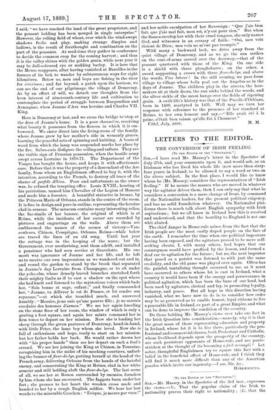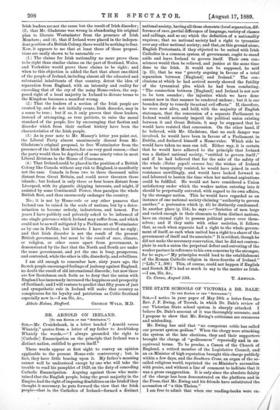[To THE EDITOR OF THE " SPECTATOR."] SIB., —Mr. Massey, in
the Spectator of the 3rd inst., expresses the views,—(l), That the popular claim of the Irish to nationality proves their right to nationality ; (2), that the
Irish leaders are not the cause but the result of Irish disorder ; (3), that Mr. Gladstone was wrong in abandoning his original plan to liberate Westminster from the presence of Irish Members ; and (4), that if Ireland were placed in the indepen- dent position of a British Colony, there would be nothing to fear. Now, it appears to me that at least three of these proposi- tions are easily shown to be untenable :-
(1.) The claims for Irish nationality no more prove them to be right than similar claims on the part of Scotland, Wales, and Yorkshire would prove these claims to be right; and when to this objection is added the fact that about one-third of the people of Ireland, including almost all the educated and substantial inhabitants of that country, detest the idea of separation from England, with an intensity and reality far exceeding that of the cry of the noisy Home-rulers, the sup- posed right of a local majority in Ireland to dictate terms to the Kingdom becomes a manifest wrong.
(2.) That the leaders of a section of the Irish people are created by, and do not initially create, Irish disorder, may in a sense be true ; but if so, it only proves that these leaders, instead of attempting, as true patriots, to raise the moral standard of the people, live by encouraging that faction and disorder which from their earliest history have been the characteristics of the Irish people.
(3.) As in your note to Mr. Massey's letter you point out, the Liberal Party almost unanimously dissent from Mr. Gladstone's original proposal, to free Westminster from the presence of the Irish Members, for one very good reason,—that the party would thus be deprived of some ninety votes in most Liberal divisions in the House of Commons.
(4.) That Ireland could be placed in the position of a British Colony like Canada without any risk to England, is manifestly not the case. Canada is from two to three thousand 'miles distant from Great Britain, and could never threaten these islands ; but Ireland is only three or four hours distant from Liverpool, with its gigantic shipping interests, and might, if assisted by some Continentil Power, thus paralyse the whole British fleet., and thus enormously endanger the country.
No ; it is not by Home-role or any other panacea that Ireland can be raised in the scale of nations, but by a deter- mination to become orderly, industrious, and honest. For years I have publicly and privately asked to be informed of one single grievance which Ireland may suffer from, and which could not be as well mitigated by a Parliament at Westminster as by one in Dublin; but hitherto I have received no reply; and that Irish disorder is not the result of the present British government, but must be the result of race, climate, or religion, or other cause apart from government., is demonstrated by the fact that the North and South are under the same government, and yet the one is busy, prosperous, and contented, while the other is idle, disorderly, and rebellious.
I am old enough to remember how, sixty years ago, the Scotch people encouraged feelings of jealousy against England, no doubt the result of old international discords ; but now there are few Scotchmen such fools as to deny that the union with England has immensely increased the happiness and prosperity of Scotland ; and I will venture to predict that fifty years of just and sympathetic rule in Ireland will make that country as conspicuous for its loyalty and patriotism as Celtic Scotland especially now is.—I am Sir, &c.,



































 Previous page
Previous page